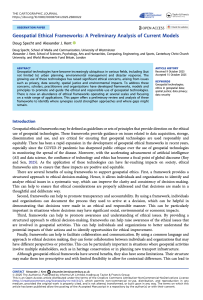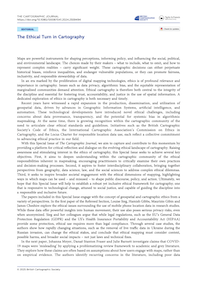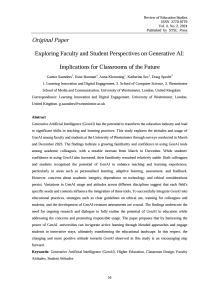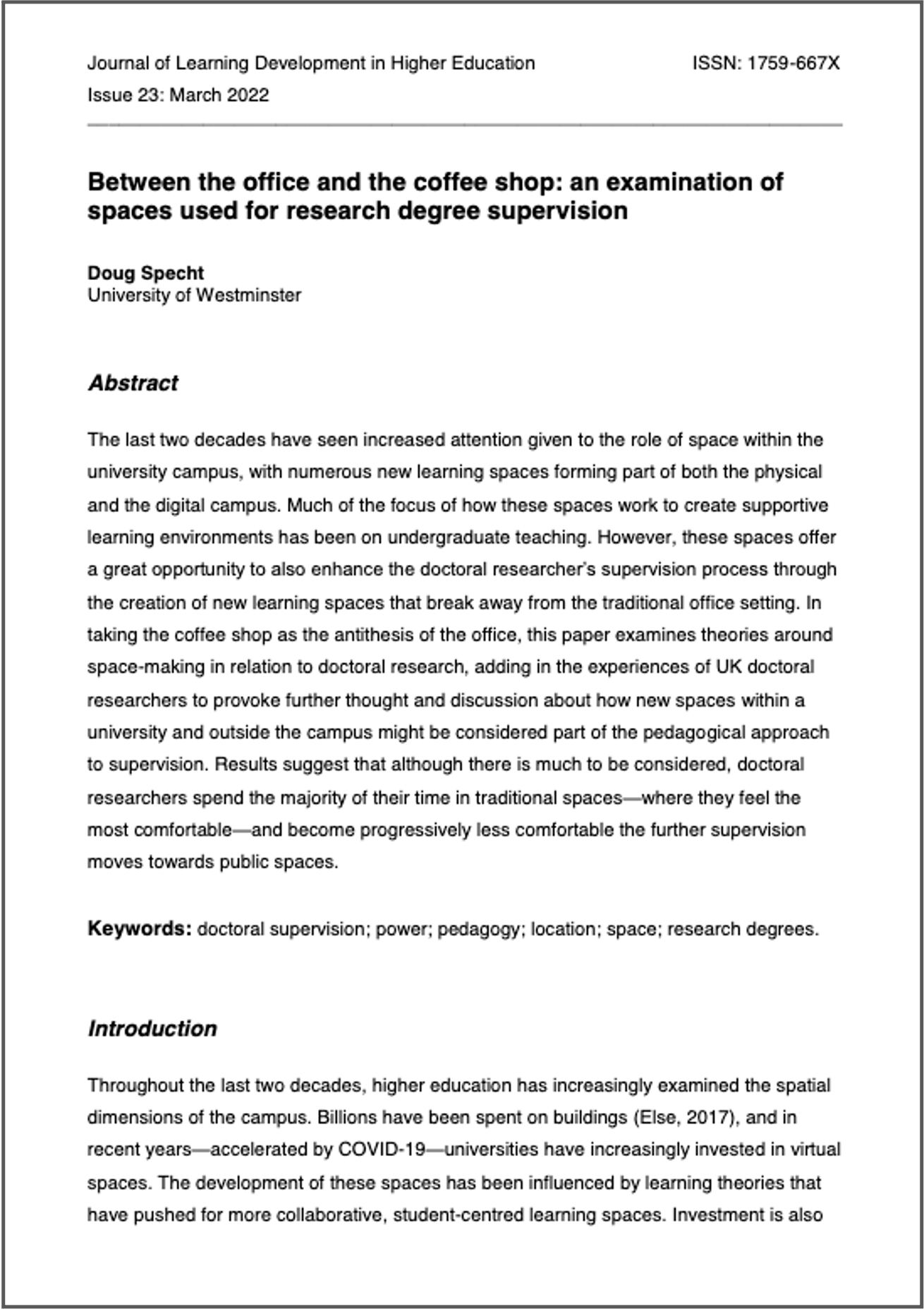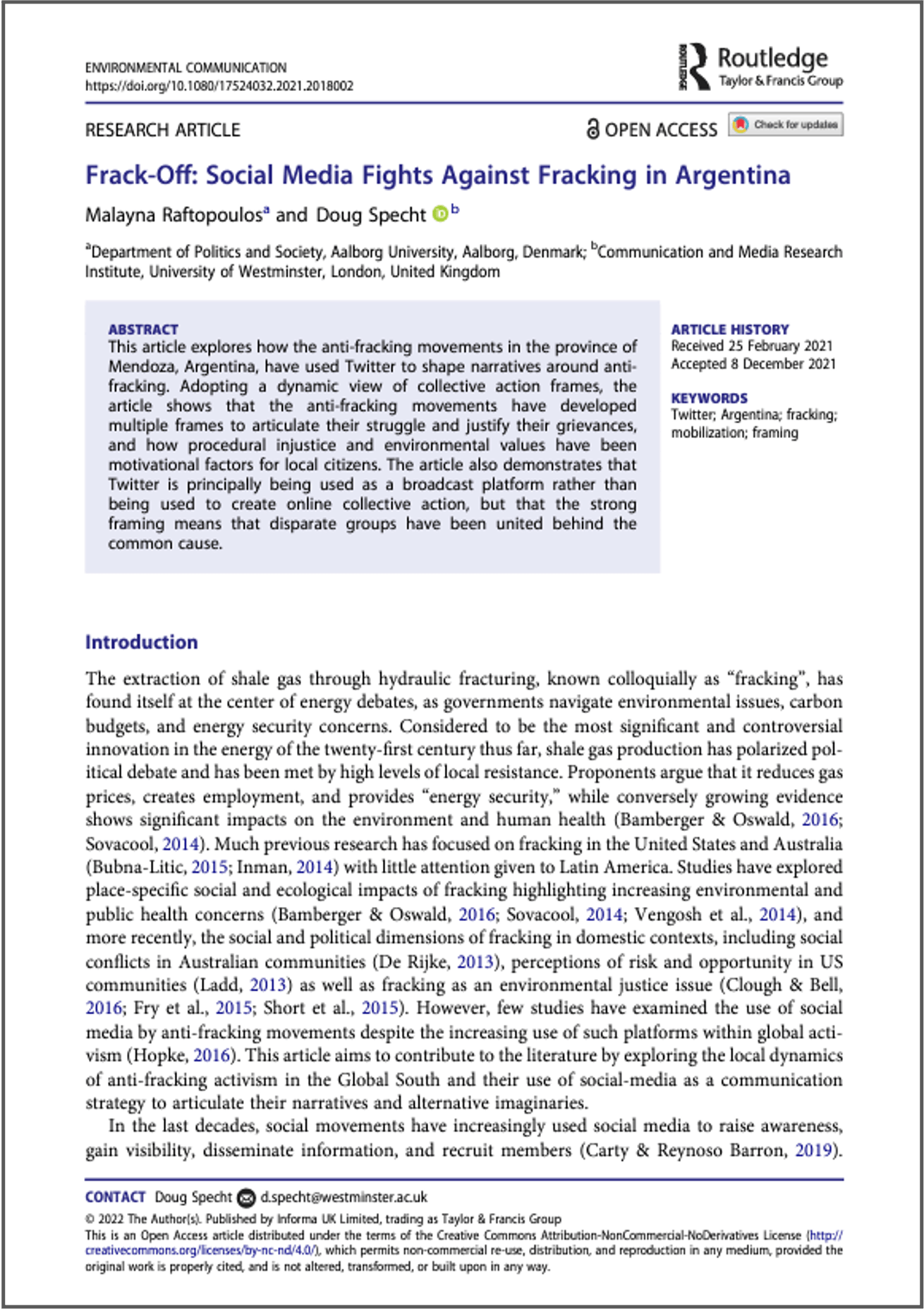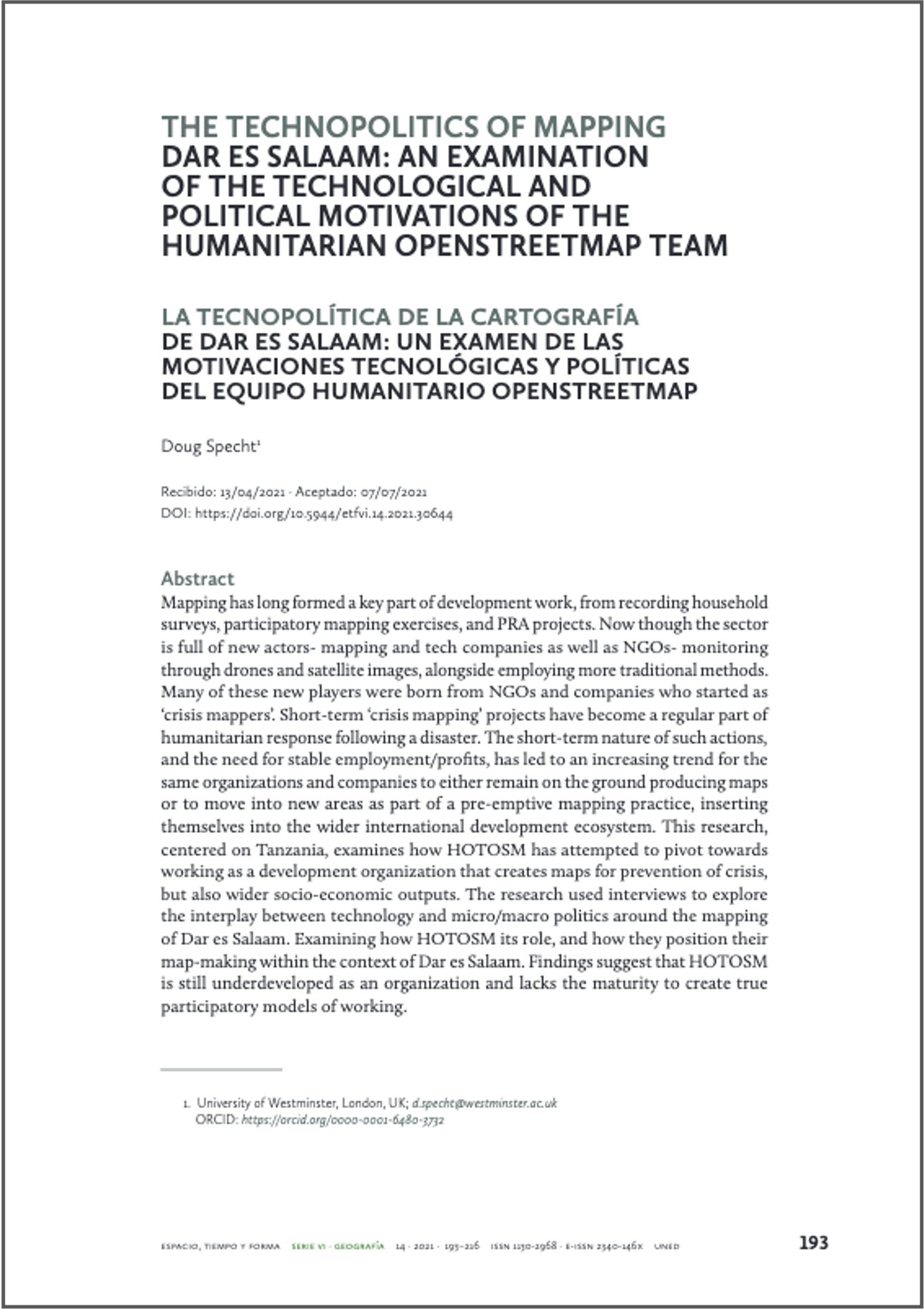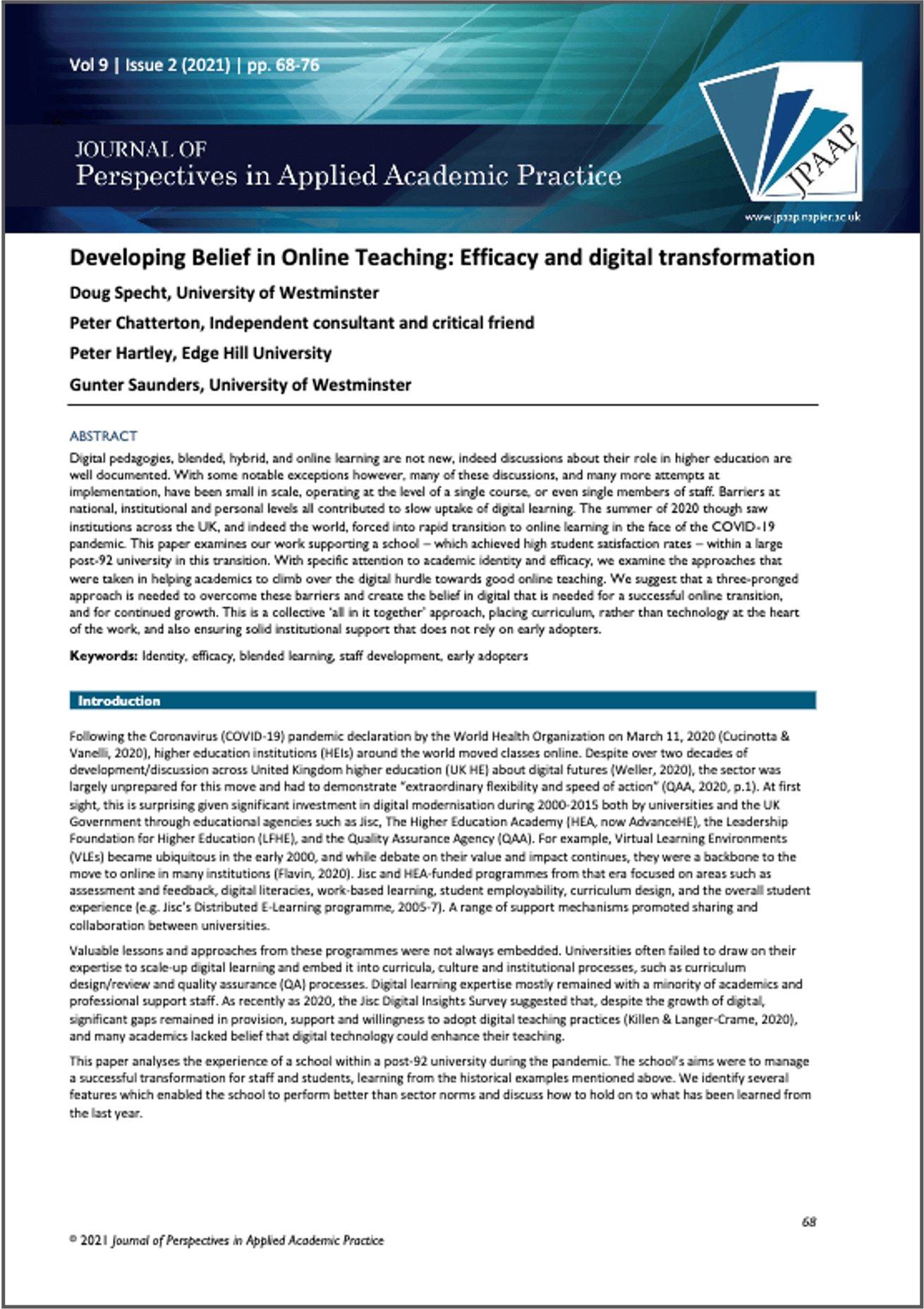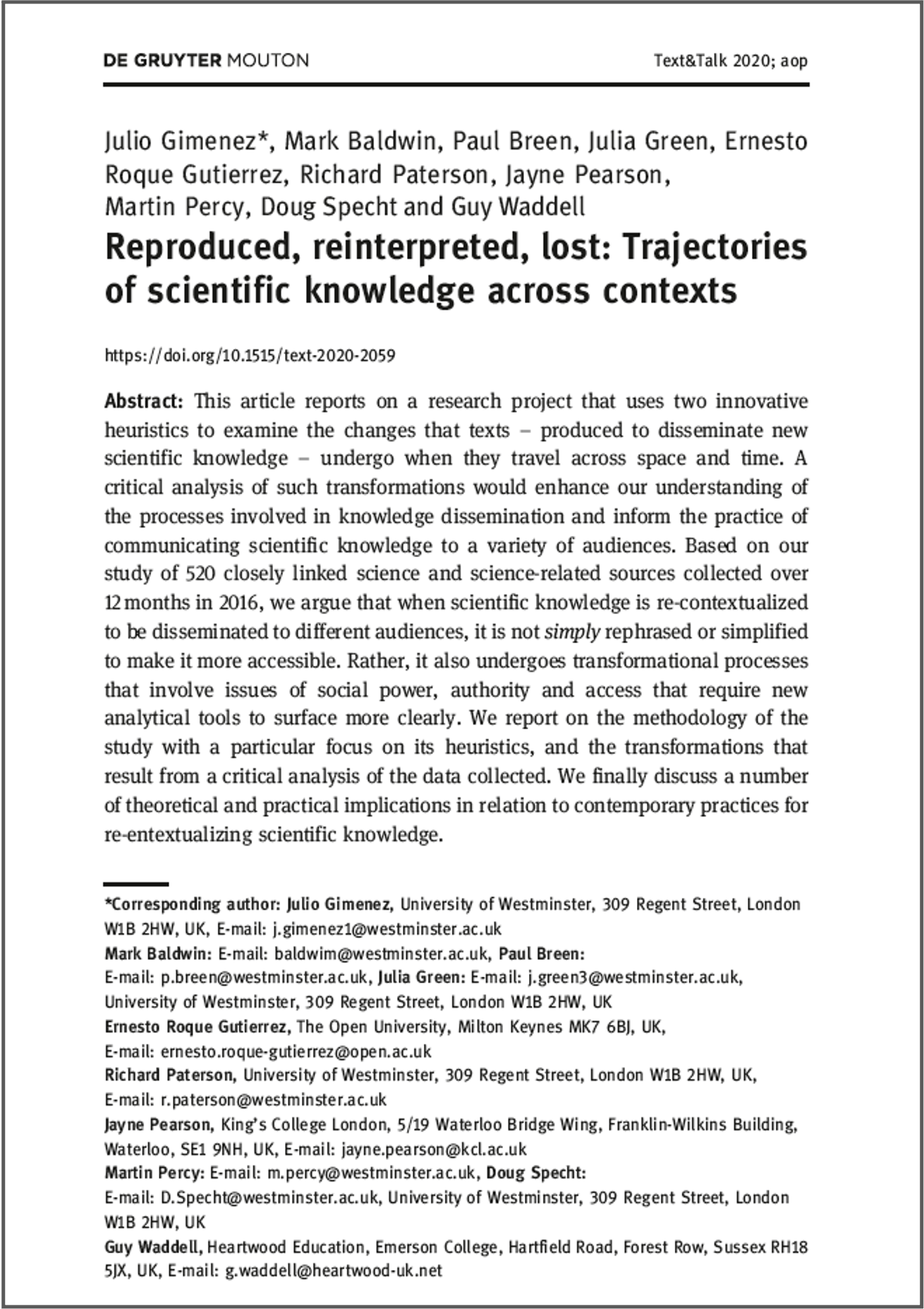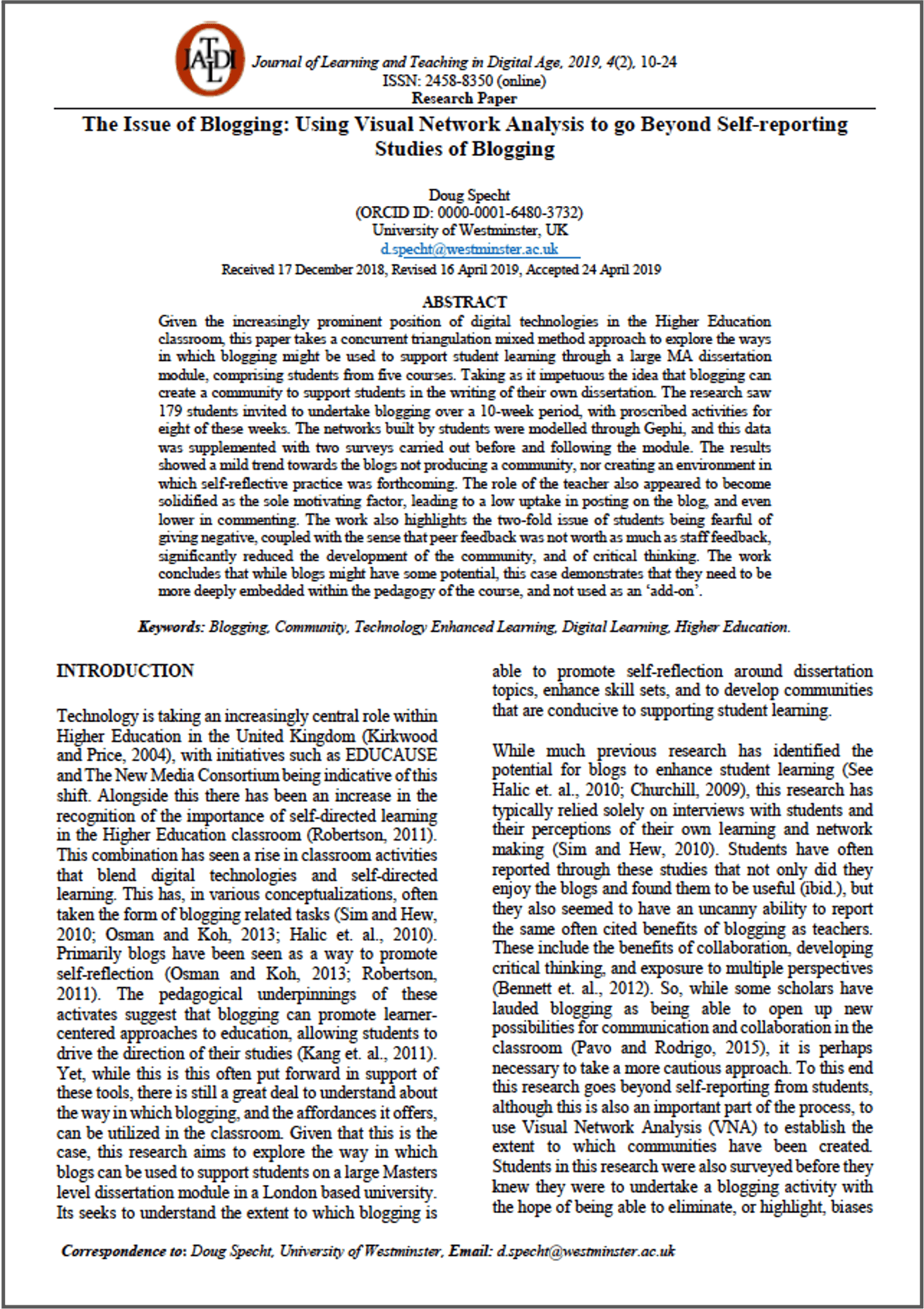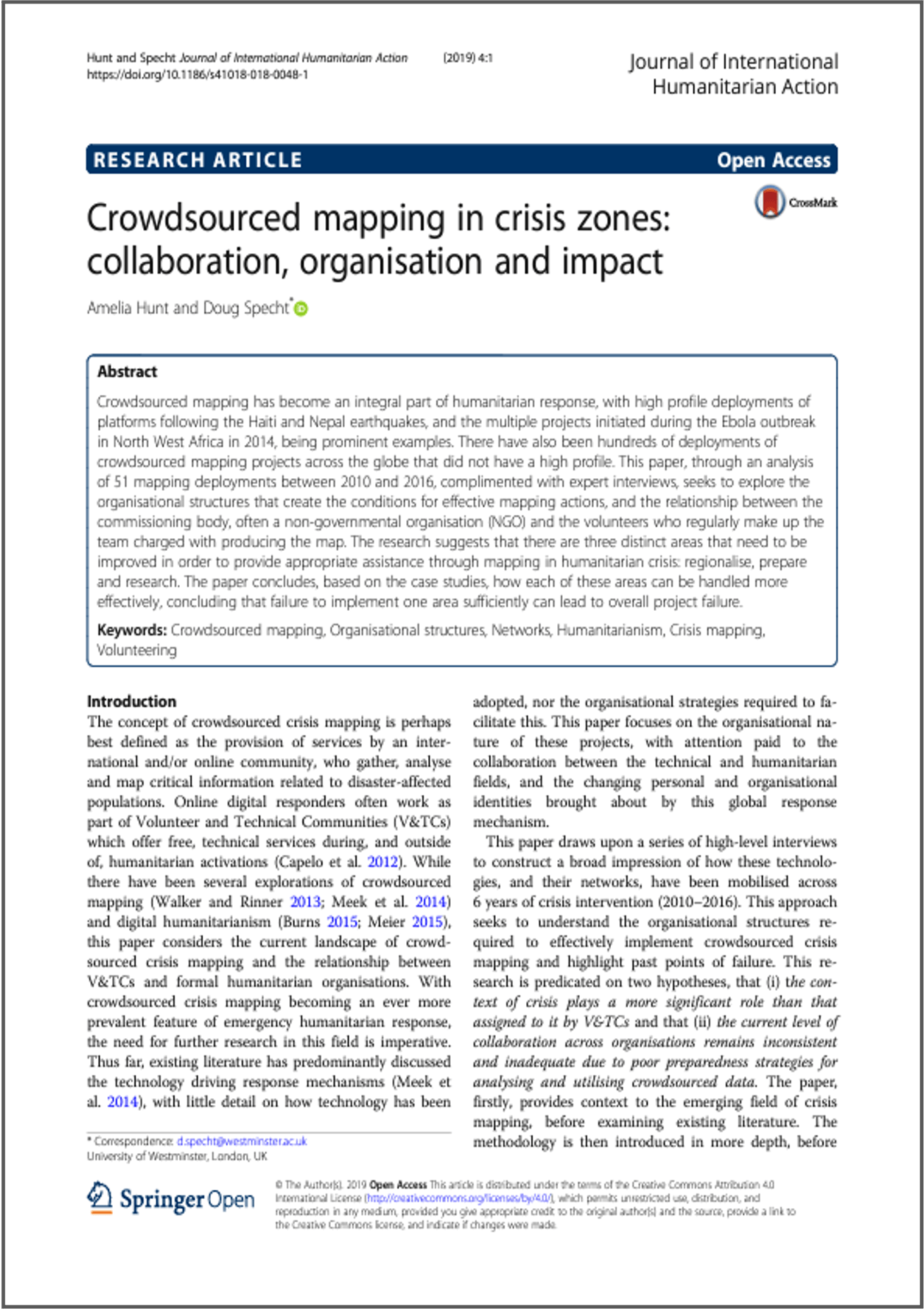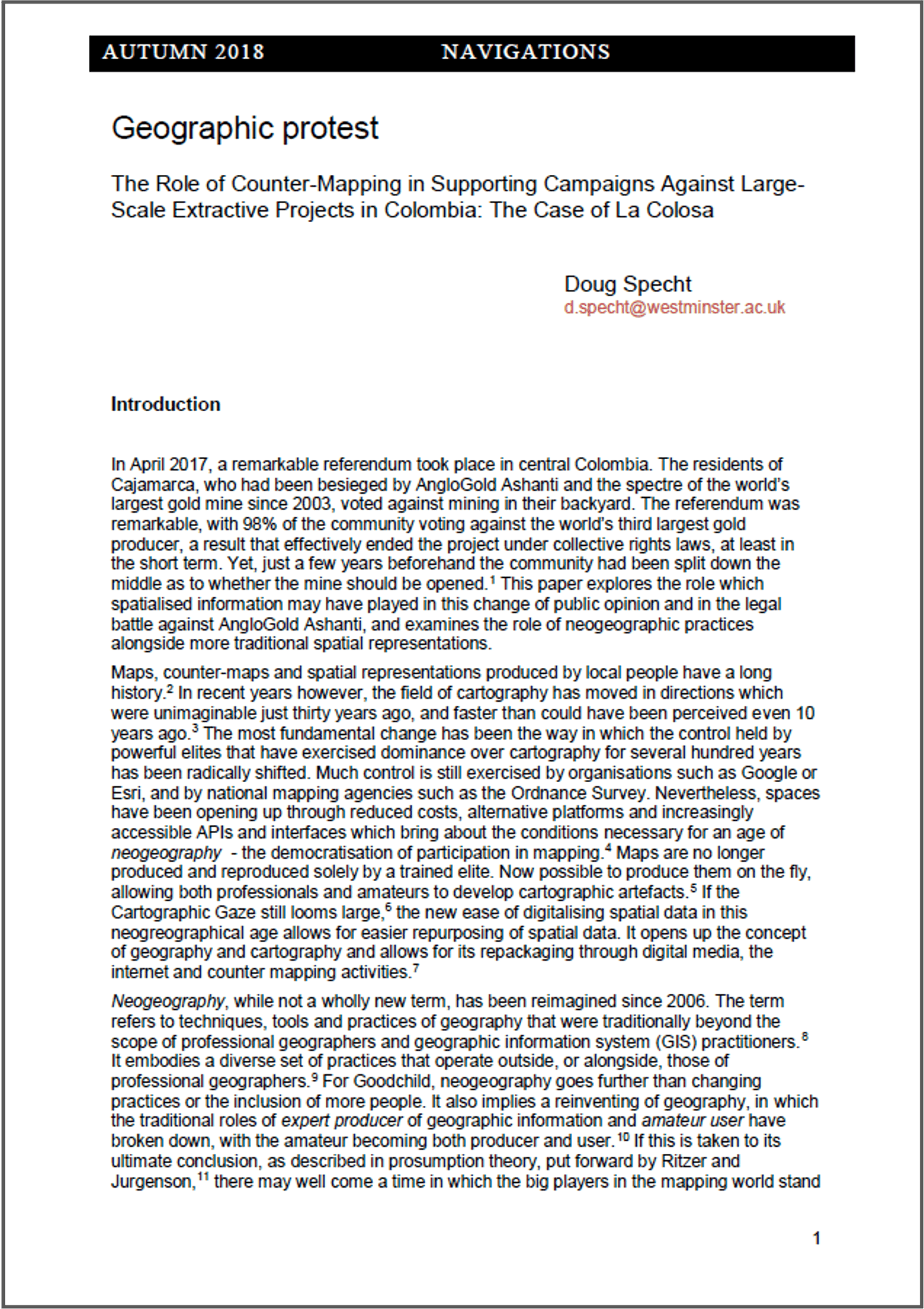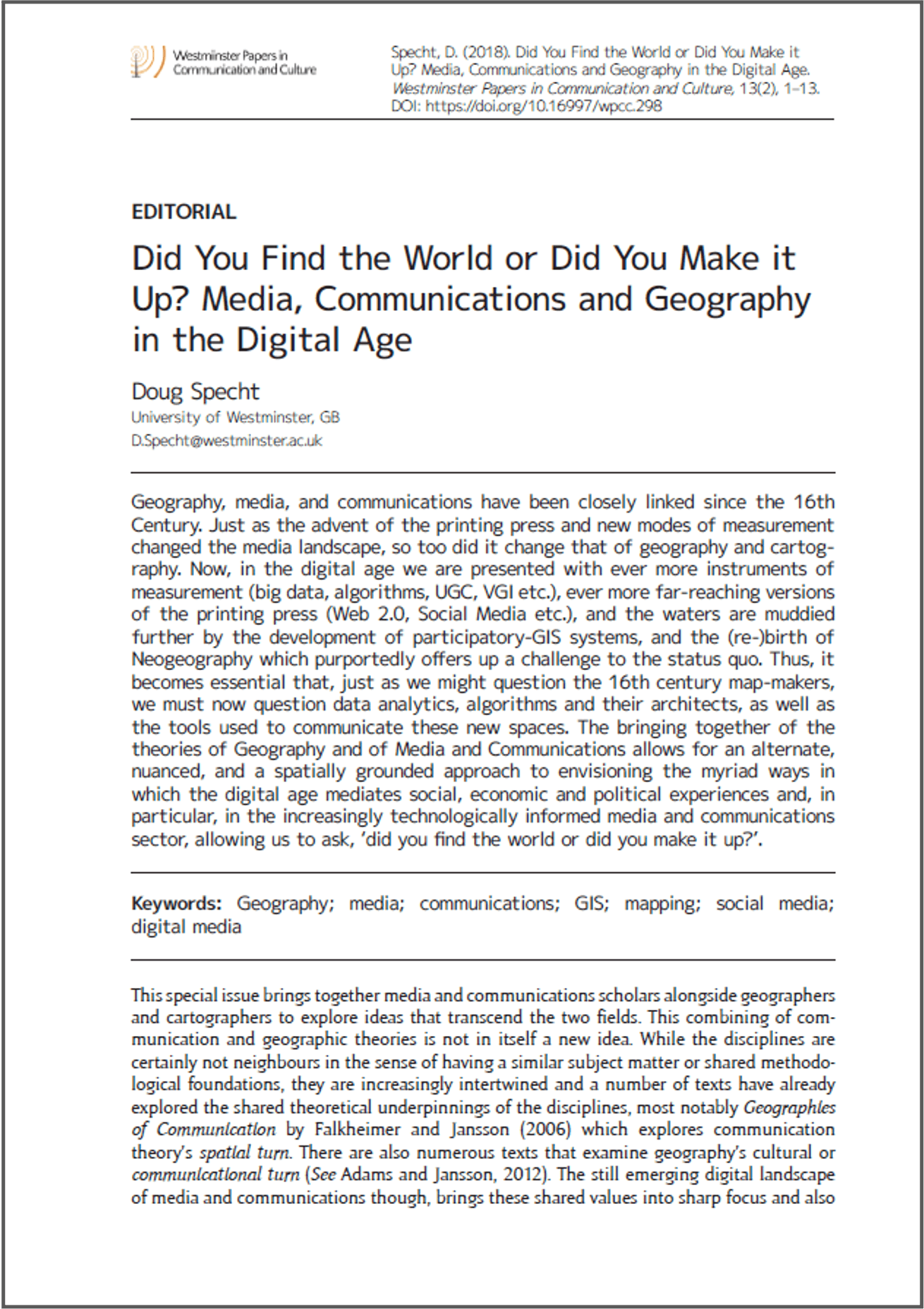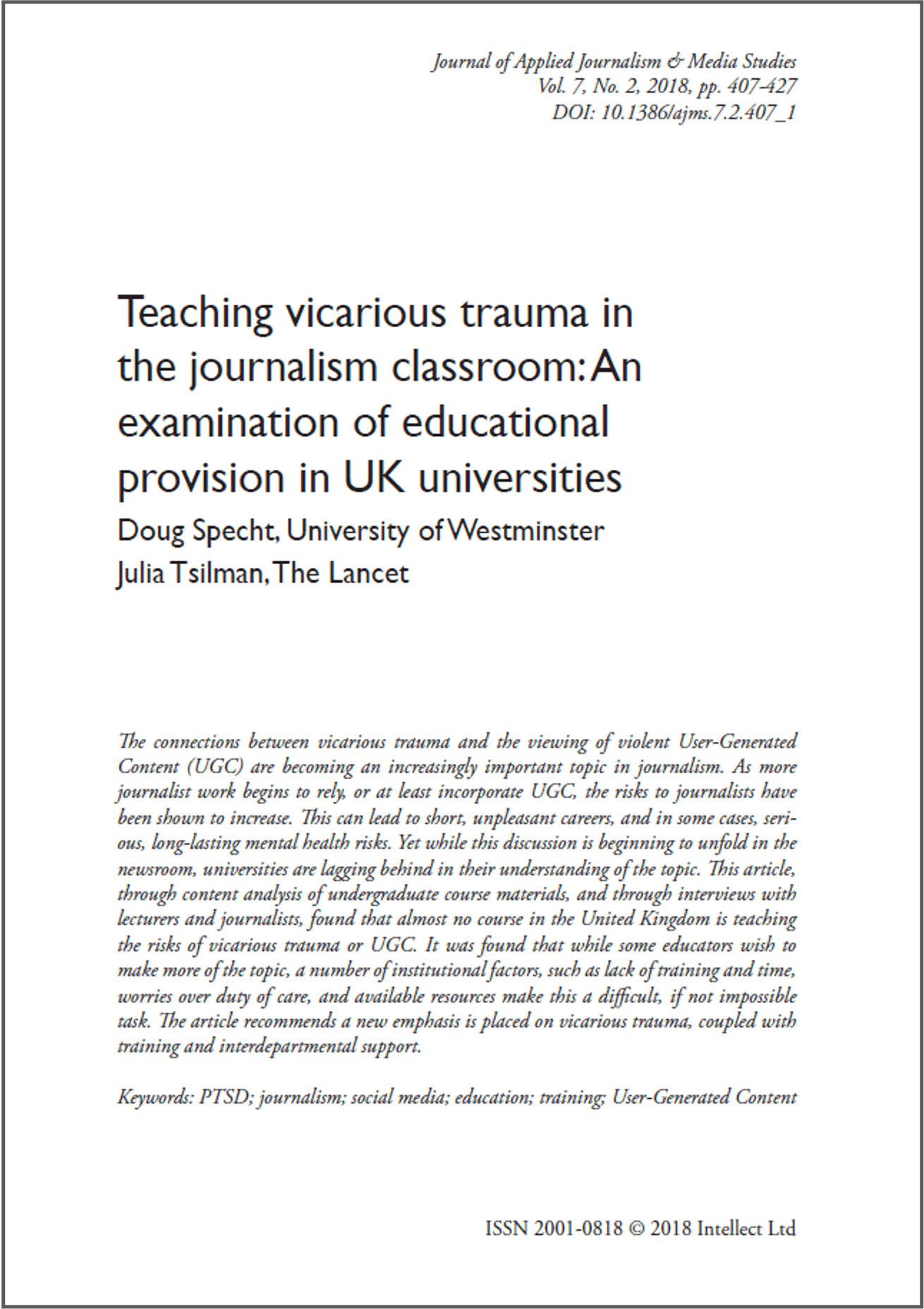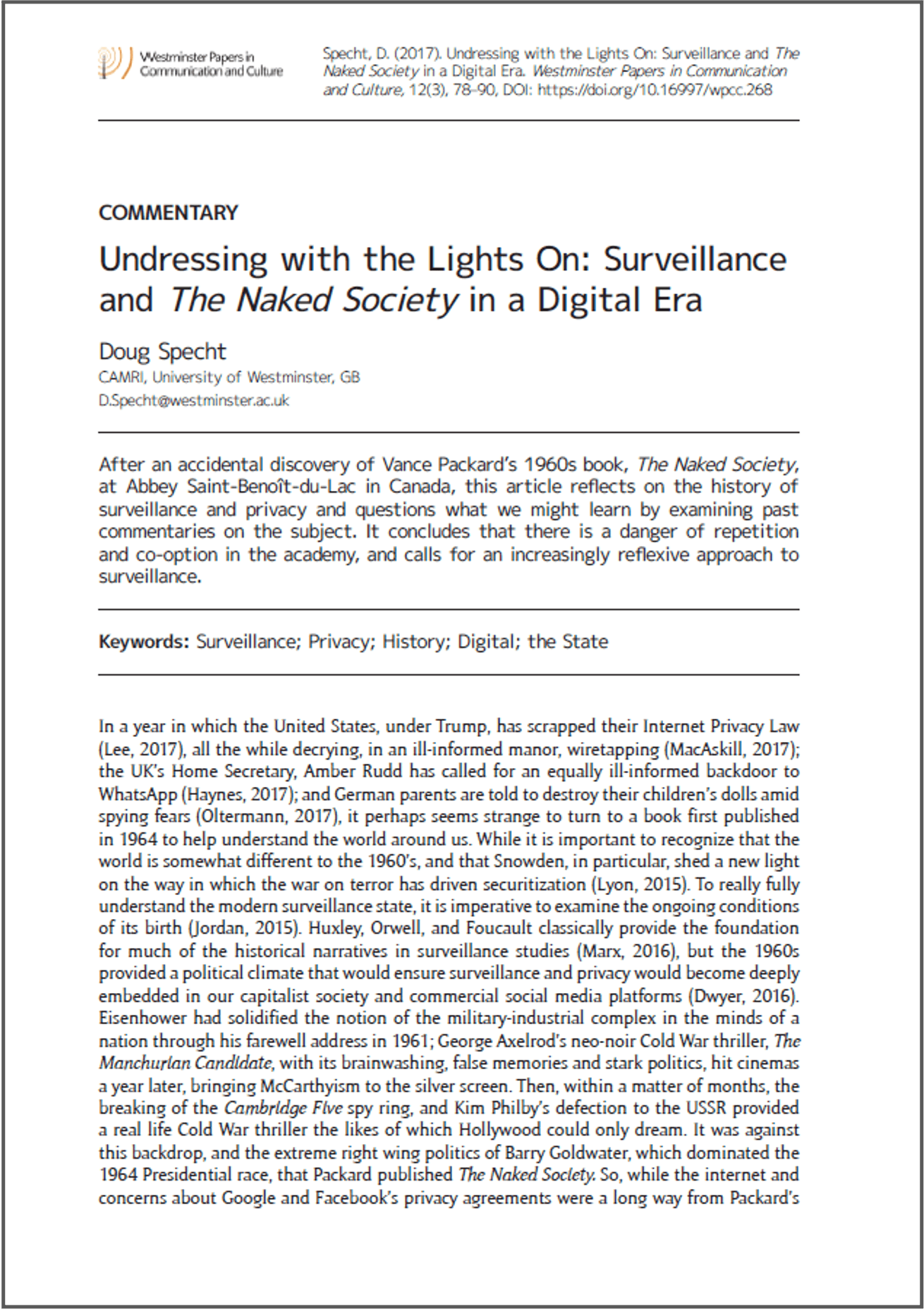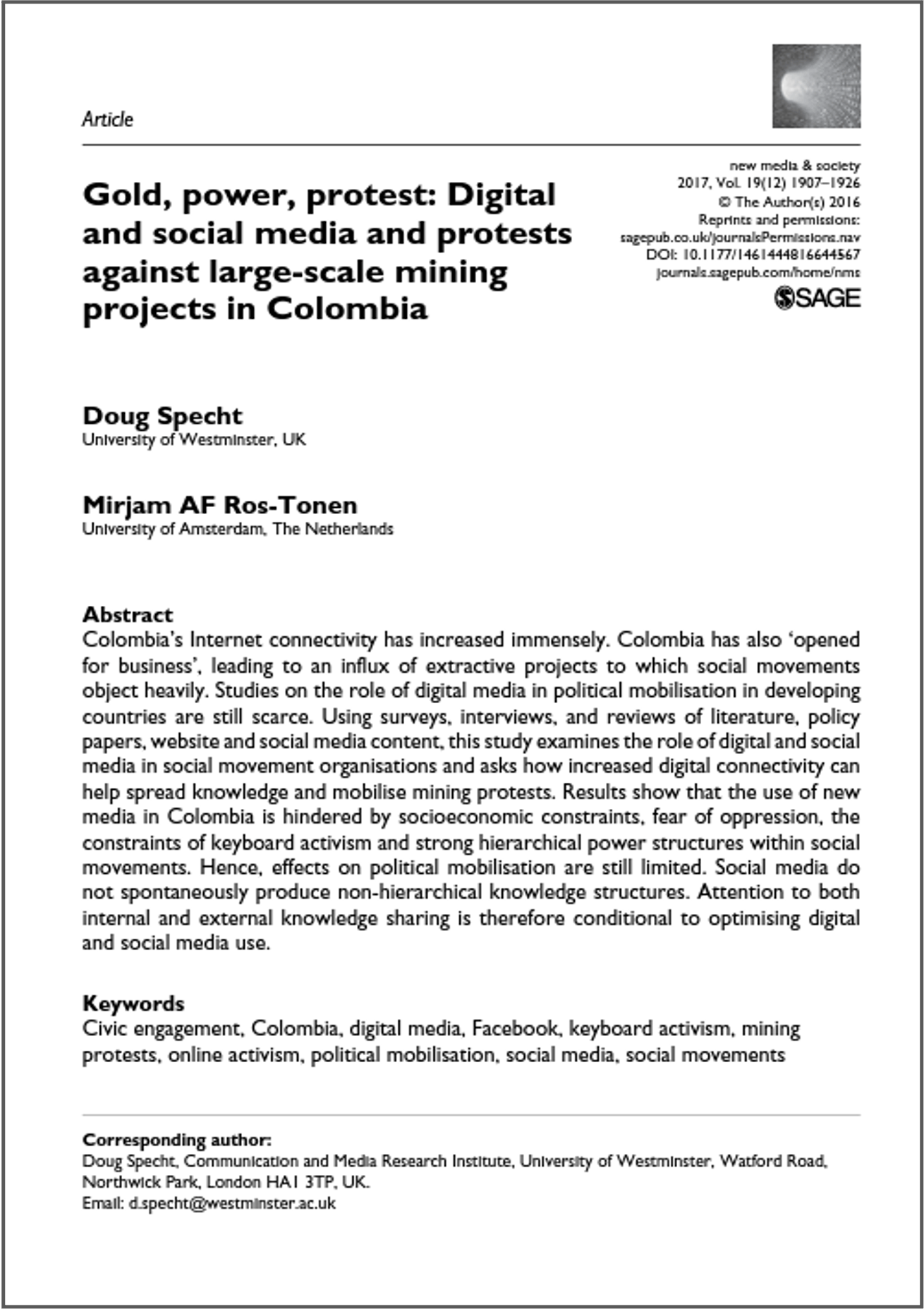2025
Geospatial Ethical Frameworks: A Preliminary Analysis of Current Models
Specht, Doug; Kent, Alexander J.Journal ArticleOpen Access
In: The Cartographic Journal , vol. 61, iss. 4, pp. 1-13, 2025.
@article{nokey,
title = {Geospatial Ethical Frameworks: A Preliminary Analysis of Current Models},
author = {Doug Specht and Alexander J. Kent},
url = {https://www.tandfonline.com/doi/full/10.1080/00087041.2025.2580022?src=
https://doi.org/10.1080/00087041.2025.2580022},
doi = {https://doi.org/10.1080/00087041.2025.2580022},
year = {2025},
date = {2025-11-17},
urldate = {2025-11-17},
journal = {The Cartographic Journal },
volume = {61},
issue = {4},
pages = {1-13},
keywords = {},
pubstate = {published},
tppubtype = {article}
}
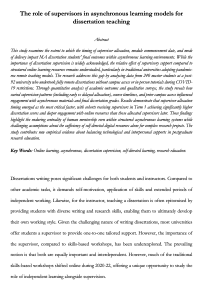
The role of supervisors in asynchronous learning models for dissertation teaching
Specht, Doug; Lowe, HarrietJournal Article
In: Journal of the Scholarship of Teaching and Learning, vol. 25, iss. 4, 2025.
@article{nokey,
title = {The role of supervisors in asynchronous learning models for dissertation teaching},
author = {Doug Specht and Harriet Lowe},
url = {https://doi.org/10.14434/josotl.v25i4.37528},
doi = {https://doi.org/10.14434/josotl.v25i4.37528},
year = {2025},
date = {2025-10-31},
urldate = {2025-12-01},
journal = {Journal of the Scholarship of Teaching and Learning},
volume = {25},
issue = {4},
abstract = {This study examines the extent to which the timing of supervisor allocation, module commencement date, and mode of delivery impact MA dissertation students' final outcomes within asynchronous learning environments. While the importance of dissertation supervision is widely acknowledged, the relative effect of supervisory support compared to structured online learning resources remains understudied, particularly in traditional universities adopting pandemic-era remote teaching models. The research addresses this gap by analysing data from 240 master students at a post-92 university who undertook fully remote dissertations without campus access or in-person tutorials during COVID-19 restrictions. Through quantitative analysis of academic outcomes and qualitative surveys, the study reveals how varied supervision patterns (including early vs delayed allocation), course timelines, and prior campus access influenced engagement with asynchronous materials and final dissertation grades. Results demonstrate that supervisor allocation timing emerged as the most critical factor, with cohorts receiving supervisors in Term 1 achieving significantly higher dissertation scores and deeper engagement with online resources than those allocated supervisors later. These findings highlight the enduring centrality of human mentorship even within structured asynchronous learning systems while challenging assumptions about the sufficiency of self-directed digital resources alone for complex research projects. The study contributes new empirical evidence about balancing technological and interpersonal supports in postgraduate research education.},
keywords = {},
pubstate = {published},
tppubtype = {article}
}
The Ethical Turn in Cartography
Doug Specht Aileen Buckley,; Kent, Alexander J.Journal Article
In: The Cartographic Journal , vol. 61, iss. 4, pp. 1-3, 2025.
@article{nokey,
title = {The Ethical Turn in Cartography},
author = {Aileen Buckley,Doug Specht, and Alexander J. Kent},
url = {https://doi.org/10.1080/00087041.2024.2559494},
year = {2025},
date = {2025-09-30},
journal = {The Cartographic Journal },
volume = {61},
issue = {4},
pages = {1-3},
keywords = {},
pubstate = {published},
tppubtype = {article}
}
2024
Mapping the Unmappable: Cartography at war
Specht, DougJournal ArticleOpen Access
In: LivingMaps Review, 2024.
@article{nokey,
title = {Mapping the Unmappable: Cartography at war},
author = {Doug Specht},
url = {https://www.livingmaps.org/mapping-the-unmappable},
year = {2024},
date = {2024-04-12},
urldate = {2024-04-12},
journal = {LivingMaps Review},
keywords = {},
pubstate = {published},
tppubtype = {article}
}
Ester Bonmati Gunter Saunders, Anna Klemming; Specht, DougJournal ArticleOpen Access
In: Review of Education Studies, vol. 4, iss. 2, pp. 55-76, 2024.
@article{nokey,
title = {Exploring Faculty and Student Perspectives on Generative AI: Implications for Classrooms of the Future},
author = {Gunter Saunders, Ester Bonmati, Anna Klemming, Katherine Sev, and Doug Specht},
url = {https://doi.org/10.71002/res.v4n2p55},
doi = {https://doi.org/10.71002/res.v4n2p55},
year = {2024},
date = {2024-04-01},
urldate = {2024-04-01},
journal = {Review of Education Studies},
volume = {4},
issue = {2},
pages = {55-76},
abstract = {Generative Artificial Intelligence (GenAI) has the potential to transform the education industry and lead to significant shifts in teaching and learning practices. This study explores the attitudes and usage of GenAI among faculty and students at the University of Westminster through surveys conducted in March and December 2023. The findings indicate a growing familiarity and confidence in using GenAI tools among academic colleagues, with a notable increase from March to December. While students' confidence in using GenAI also increased, their familiarity remained relatively stable. Both colleagues and students recognised the potential of GenAI to enhance teaching and learning experiences, particularly in areas such as personalised learning, adaptive learning, assessment, and feedback. However, concerns about academic integrity, dependence on technology, and ethical considerations persist. Variations in GenAI usage and attitudes across different disciplines suggest that each field's specific needs and contexts influence the integration of these tools. To successfully integrate GenAI into educational practices, strategies such as clear guidelines on ethical use, training for colleagues and students, and the development of GenAI-resistant assessments are crucial. The findings underscore the need for ongoing research and dialogue to fully realise the potential of GenAI in education while addressing the concerns and promoting responsible usage. The paper proposes that by harnessing the power of GenAI, universities can invigorate active learning through blended approaches and engage students in innovative ways, ultimately transforming the educational landscape. In this respect, the changing and more positive attitude towards GenAI observed in this study is an encouraging step forward.},
keywords = {},
pubstate = {published},
tppubtype = {article}
}
2023
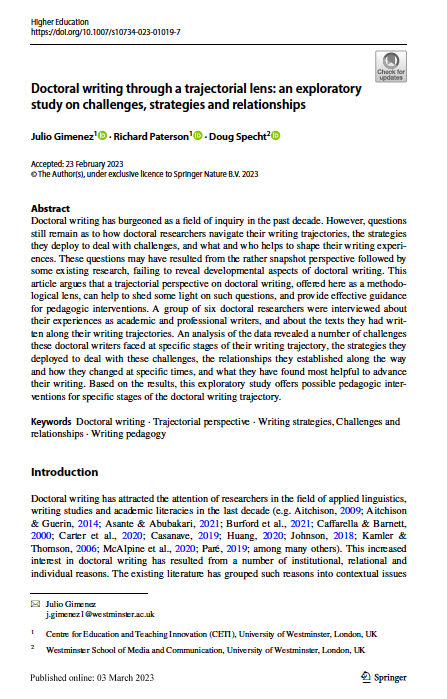
Gimenez, Julio; Patterson, Richard; Specht, DougJournal ArticleOpen Access
In: Higher Education, 2023.
@article{nokey,
title = {Doctoral writing through a trajectorial lens: an exploratory study on challenges, strategies and relationships},
author = {Julio Gimenez and Richard Patterson and Doug Specht},
url = {https://link.springer.com/article/10.1007/s10734-023-01019-7},
year = {2023},
date = {2023-03-03},
urldate = {2023-03-03},
journal = {Higher Education},
keywords = {},
pubstate = {published},
tppubtype = {article}
}
2022
Between the Office and the Coffee Shop: A examination of spaces used for research degree supervision
Specht, DougJournal ArticleOpen Access
In: Journal of Learning Development in Higher Education, vol. 23, 2022.
@article{nokey,
title = {Between the Office and the Coffee Shop: A examination of spaces used for research degree supervision},
author = {Doug Specht},
doi = {https://doi.org/10.47408/jldhe.vi23.828},
year = {2022},
date = {2022-03-16},
urldate = {2022-03-16},
journal = {Journal of Learning Development in Higher Education},
volume = {23},
abstract = {The last two decades have seen increased attention given to the role of space within the university campus, with numerous new learning spaces forming part of both the physical and the digital campus. Much of the focus of how these spaces work to create supportive learning environments has been on undergraduate teaching. However, these spaces offer a great opportunity to also enhance the doctoral researcher’s supervision process through the creation of new learning spaces that break away from the traditional office setting. In taking the coffee shop as the antithesis of the office, this paper examines theories around space-making in relation to doctoral research, adding in the experiences of UK doctoral researchers to provoke further thought and discussion about how new spaces within a university and outside the campus might be considered part of the pedagogical approach to supervision. Results suggest that although there is much to be considered, doctoral researchers spend the majority of their time in traditional spaces—where they feel the most comfortable—and become progressively less comfortable the further supervision moves towards public spaces.},
key = {Key},
keywords = {},
pubstate = {published},
tppubtype = {article}
}
Frack-Off: Social media fights against Fracking in Argentina
Raftopoulos, Malayna; Specht, DougJournal ArticleOpen Access
In: Environmental Communication , 2022.
@article{nokey,
title = {Frack-Off: Social media fights against Fracking in Argentina},
author = {Malayna Raftopoulos and Doug Specht},
doi = {https://doi.org/10.1080/17524032.2021.2018002},
year = {2022},
date = {2022-01-04},
urldate = {2022-01-04},
journal = {Environmental Communication },
abstract = {This article explores how the anti-fracking movements in the province of Mendoza, Argentina, have used Twitter to shape narratives around anti-fracking. Adopting a dynamic view of collective action frames, the article shows that the anti-fracking movements have developed multiple frames to articulate their struggle and justify their grievances, and how procedural injustice and environmental values have been motivational factors for local citizens. The article also demonstrates that Twitter is principally being used as a broadcast platform rather than being used to create online collective action, but that the strong framing means that disparate groups have been united behind the common cause.
},
keywords = {},
pubstate = {published},
tppubtype = {article}
}
2021
Specht, DougJournal ArticleOpen Access
In: Espacio, Tiempo y Forma. Serie VI, Geografía, vol. 14, pp. 193-216, 2021.
@article{Specht2021,
title = {The Technopolitics of Mapping Dar es Salaam: An examination of the technological and political motivations of the Humanitarian OpenStreetMap Team},
author = {Doug Specht},
doi = {https://doi.org/10.5944/etfvi.14.2021.30644},
year = {2021},
date = {2021-11-17},
urldate = {2021-11-17},
journal = {Espacio, Tiempo y Forma. Serie VI, Geografía},
volume = {14},
pages = {193-216},
abstract = {Mapping has long formed a key part of development work, from recording household surveys, participatory mapping exercises, and PRA projects. Now though the sector is full of new actors- mapping and tech companies as well as NGOs- monitoring through drones and satellite images, alongside employing more traditional methods. Many of these new players were born from NGOs and companies who started as ‘crisis mappers. Short-term ‘crisis mapping’ projects have become a regular part of humanitarian response following a disaster. The short-term nature of such actions, and the need for stable employment/profits, has led to an increasing trend for the same organizations and companies to either remain on the ground producing maps or to move into new areas as part of a pre-emptive mapping practice, inserting themselves into the wider international development ecosystem. This research, centered on Tanzania, examines how HOTOSM has attempted to pivot towards working as a development organization that creates maps for prevention of crisis, but also wider socio-economic outputs. The research used interviews to explore the interplay between technology and micro/macro politics around the mapping of Dar es Salaam. Examining how HOTOSM its role, and how they position their map-making within the context of Dar es Salaam. Findings suggest that HOTOSM is still underdeveloped as an organization and lacks the maturity to create true participatory models of working.},
keywords = {},
pubstate = {published},
tppubtype = {article}
}
Developing Belief in Online Teaching: Efficacy and Digital Transformation
Specht, D; Chatterton, P; Hartley, P; Saunders, GJournal ArticleOpen Access
In: Journal of Perspectives in Applied Academic Practice, vol. 9, no. 2, 2021.
@article{nokey,
title = {Developing Belief in Online Teaching: Efficacy and Digital Transformation},
author = {D Specht and P Chatterton and P Hartley and G Saunders},
url = {https://jpaap.napier.ac.uk/index.php/JPAAP/article/view/486},
doi = {https://doi.org/10.14297/jpaap.v9i2.486},
year = {2021},
date = {2021-08-05},
urldate = {2021-08-05},
journal = {Journal of Perspectives in Applied Academic Practice},
volume = {9},
number = {2},
abstract = {Digital pedagogies, blended, hybrid, and online learning are not new, indeed discussions about their role in higher education are well documented. With some notable exceptions however, many of these discussions, and many more attempts at implementation, have been small in scale, operating at the level of a single course, or even single members of staff. Barriers at national, institutional and personal levels all contributed to slow uptake of digital learning. The summer of 2020 though saw institutions across the UK, and indeed the world, forced into rapid transition to online learning in the face of the COVID-19 pandemic. This paper examines our work supporting a school - which achieved high student satisfaction rates - within a large post-92 university in this transition. With specific attention to academic identity and efficacy, we examine the approaches that were taken in helping academics to climb over the digital hurdle towards good online teaching. We suggest that a three-pronged approach is needed to overcome these barriers and create the belief in digital that is needed for a successful online transition, and for continued growth. These are a collective ‘all in it together’ approach, placing curriculum, rather than technology at the heart of the work, and also ensuring solid institutional support that does not rely on early adopters.},
keywords = {},
pubstate = {published},
tppubtype = {article}
}
2020
Reproduced, reinterpreted, lost: Trajectories of scientific knowledge across contexts
Gimenez, Julio; Baldwin, Mark; Breen, Paul; Green, Julia; Gutierrez, Ernesto Roque; Paterson, Richard; Pearson, Jayne; Percy, Martin; Specht, Doug; Waddell, GuyJournal Article
In: Text & Talk, vol. 40, iss. 3, pp. 293-324, 2020.
@article{nokey,
title = {Reproduced, reinterpreted, lost: Trajectories of scientific knowledge across contexts},
author = {Julio Gimenez and Mark Baldwin and Paul Breen and Julia Green and Ernesto Roque Gutierrez and Richard Paterson and Jayne Pearson and Martin Percy and Doug Specht and Guy Waddell},
doi = {https://doi.org/10.1515/text-2020-2059},
year = {2020},
date = {2020-02-11},
urldate = {2020-02-11},
journal = {Text & Talk},
volume = {40},
issue = {3},
pages = {293-324},
abstract = {This article reports on a research project that uses two innovative heuristics to examine the changes that texts – produced to disseminate new scientific knowledge – undergo when they travel across space and time. A critical analysis of such transformations would enhance our understanding of the processes involved in knowledge dissemination and inform the practice of communicating scientific knowledge to a variety of audiences. Based on our study of 520 closely linked science and science-related sources collected over 12 months in 2016, we argue that when scientific knowledge is re-contextualized to be disseminated to different audiences, it is not simply rephrased or simplified to make it more accessible. Rather, it also undergoes transformational processes that involve issues of social power, authority and access that require new analytical tools to surface more clearly. We report on the methodology of the study with a particular focus on its heuristics, and the transformations that result from a critical analysis of the data collected. We finally discuss a number of theoretical and practical implications in relation to contemporary practices for re-entextualizing scientific knowledge.},
keywords = {},
pubstate = {published},
tppubtype = {article}
}
2019
The Issue of Blogging: Using Visual Network Analysis to go Beyond Self-reporting Studies of Blogging
Specht, DougJournal ArticleOpen Access
In: Journal of Learning and Teaching in the Digital Age, vol. 4, no. 2, 2019, ISSN: 2458-8350.
@article{nokey,
title = {The Issue of Blogging: Using Visual Network Analysis to go Beyond Self-reporting Studies of Blogging},
author = {Doug Specht},
url = {https://www.learntechlib.org/p/216632
},
issn = {2458-8350},
year = {2019},
date = {2019-07-01},
urldate = {2019-07-01},
journal = {Journal of Learning and Teaching in the Digital Age},
volume = {4},
number = {2},
abstract = {Given the increasingly prominent position of digital technologies in the Higher Education classroom, this paper uses a mixed method approach to explore the ways in which blogging might be used to support student learning through a large MA dissertation module, comprising students from five courses. Taking as it impetuous the idea that blogging can create a community to support students in the writing of their own dissertation. The research saw 179 students invited to undertake blogging over a 10-week period, with proscribed activities for eight of these weeks. The networks built by students were modelled through Gephi, and this data was supplemented with two surveys carried out before and following the module. The results showed a mild trend towards the blogs not producing a community, nor creating an environment in which self-reflective practice was forthcoming. The role of the teacher also appeared to become solidified as the sole motivating factor, leading to a low uptake in posting on the blog, and even lower in commenting. The work also highlights the two-fold issue of students being fearful of giving negative, coupled with the sense that peer feedback was not worth as much as staff feedback, significantly reduced the development of the community, and of critical thinking. The work concludes that while blogs might have some potential, this case demonstrates that they need to be more deeply embedded within the pedagogy of the course, and not used as an ‘add-on’.},
keywords = {},
pubstate = {published},
tppubtype = {article}
}
Crowdsourced mapping in crisis zones: collaboration, organisation and impact
Hunt, Amelia; Specht, DougJournal ArticleOpen Access
In: Journal of International Humanitarian Action, vol. 4, 2019.
@article{nokey,
title = { Crowdsourced mapping in crisis zones: collaboration, organisation and impact},
author = {Amelia Hunt and Doug Specht},
url = {https://jhumanitarianaction.springeropen.com/articles/10.1186/s41018-018-0048-1},
doi = {doi.org/10.1186/s41018-018-0048-1},
year = {2019},
date = {2019-01-07},
urldate = {2019-01-07},
journal = {Journal of International Humanitarian Action},
volume = {4},
abstract = {Crowdsourced mapping has become an integral part of humanitarian response, with high profile deployments of platforms following the Haiti and Nepal earthquakes, and the multiple projects initiated during the Ebola outbreak in North West Africa in 2014, being prominent examples. There have also been hundreds of deployments of crowdsourced mapping projects across the globe that did not have a high profile. This paper, through an analysis of 51 mapping deployments between 2010 and 2016, complimented with expert interviews, seeks to explore the organisational structures that create the conditions for effective mapping actions, and the relationship between the commissioning body, often a non-governmental organisation (NGO) and the volunteers who regularly make up the team charged with producing the map. The research suggests that there are three distinct areas that need to be improved in order to provide appropriate assistance through mapping in humanitarian crisis: regionalise, prepare and research. The paper concludes, based on the case studies, how each of these areas can be handled more effectively, concluding that failure to implement one area sufficiently can lead to overall project failure.},
keywords = {},
pubstate = {published},
tppubtype = {article}
}
2018
Specht, DougJournal ArticleOpen Access
In: LivingMaps Review, vol. 5, 2018.
@article{nokey,
title = { Geographic Protest: The Role of Counter-Mapping in Supporting Campaigns Against Large-Scale Extractive Projects in Colombia: The Case of La Colosa},
author = {Doug Specht},
url = {http://livingmaps.review/journal/index.php/LMR/article/view/111},
year = {2018},
date = {2018-11-01},
urldate = {2018-11-01},
journal = {LivingMaps Review},
volume = {5},
abstract = {In a few short years, social movements in Cajamarca, Colombia, were able to convince a once divided community to near-unanimously reject establishment of the world’s largest gold mine on their doorstep. This paper examines the role of contestatory cartography in achieving this remarkable result. It explores the range of mapping and counter-mapping tools used by movements in the region, showing how a combination of classic GIS and more neogeographical tools have been used to counter the mining project from both a legal and social standing. While the paper also finds hierarchies of control are still in place and not eroded by participatory mapping activities, it also suggests that counter-mapping and the involvement of the community in exploring their own landscape was crucial to the rejection of AngloGold Ashanti’s La Colosa project.},
keywords = {},
pubstate = {published},
tppubtype = {article}
}
Specht, DougJournal ArticleOpen Access
In: Westminster Papers in Communication and Culture, vol. 13, iss. 2, pp. 1-13, 2018.
@article{nokey,
title = { Did you find the world or did you make it up?: Geography, Communications and the Media in the Digital Age},
author = {Doug Specht},
url = {https://www.westminsterpapers.org/article/id/270/},
doi = {https://doi.org/10.16997/wpcc.298},
year = {2018},
date = {2018-11-01},
urldate = {2018-11-01},
journal = { Westminster Papers in Communication and Culture},
volume = {13},
issue = {2},
pages = {1-13},
abstract = {Geography, media, and communications have been closely linked since the 16th Century. Just as the advent of the printing press and new modes of measurement changed the media landscape, so too did it change that of geography and cartography. Now, in the digital age we are presented with ever more instruments of measurement (big data, algorithms, UGC, VGI etc.), ever more far-reaching versions of the printing press (Web 2.0, Social Media etc.), and the waters are muddied further by the development of participatory-GIS systems, and the (re-)birth of Neogeography which purportedly offers up a challenge to the status quo. Thus, it becomes essential that, just as we might question the 16th century map-makers, we must now question data analytics, algorithms and their architects, as well as the tools used to communicate these new spaces. The bringing together of the theories of Geography and of Media and Communications allows for an alternate, nuanced, and a spatially grounded approach to envisioning the myriad ways in which the digital age mediates social, economic and political experiences and, in particular, in the increasingly technologically informed media and communications sector, allowing us to ask, ‘did you find the world or did you make it up?’.},
keywords = {},
pubstate = {published},
tppubtype = {article}
}
Specht, Doug; Tsilman, JuliaJournal Article
In: Journal of Applied Journalism & Media Studies, vol. 7, no. 2, pp. 407-427, 2018.
@article{nokey,
title = {Teaching vicarious trauma in the journalism classroom: an examination of educational provision in UK Universities},
author = {Doug Specht and Julia Tsilman},
url = {https://www.ingentaconnect.com/content/intellect/ajms/2018/00000007/00000002/art00010},
doi = {https://doi.org/10.1386/ajms.7.2.407_1},
year = {2018},
date = {2018-07-01},
urldate = {2018-07-01},
journal = {Journal of Applied Journalism & Media Studies},
volume = {7},
number = {2},
pages = {407-427},
abstract = {The connections between vicarious trauma and the viewing of violent User-Generated Content (UGC) are becoming an increasingly important topic in journalism. As more journalist work begins to rely, or at least incorporate UGC, the risks to journalists have been shown to increase. This can lead to short, unpleasant careers, and in some cases, serious, long-lasting mental health risks. Yet while this discussion is beginning to unfold in the newsroom, universities are lagging behind in their understanding of the topic. This article, through content analysis of undergraduate course materials, and through interviews with lecturers and journalists, found that almost no course in the United Kingdom is teaching the risks of vicarious trauma or UGC. It was found that while some educators wish to make more of the topic, a number of institutional factors, such as lack of training and time, worries over duty of care, and available resources make this a difficult, if not impossible task. The article recommends a new emphasis is placed on vicarious trauma, coupled with training and interdepartmental support.},
keywords = {},
pubstate = {published},
tppubtype = {article}
}
2017
Undressing with the Lights On: Surveillance and The Naked Society in a Digital Era
Specht, DougJournal ArticleOpen Access
In: Westminster Papers in Communication and Culture, vol. 12, iss. 3, 2017.
@article{nokey,
title = {Undressing with the Lights On: Surveillance and The Naked Society in a Digital Era},
author = {Doug Specht},
url = {https://www.westminsterpapers.org/article/id/245/},
doi = {https://doi.org/10.16997/wpcc.268},
year = {2017},
date = {2017-10-01},
urldate = {2017-10-01},
journal = {Westminster Papers in Communication and Culture},
volume = {12},
issue = {3},
abstract = {Following an accidental discovery of Vance Packard’s 1960s book, The Naked Society, at Abbey Saint-Benoît-du-Lac in Canada, this article reflects on the history of surveillance and privacy and questions what we might learn by examining past commentaries on the subject. It concludes that there is a danger of repetition and co-option in the academy, and calls for an increasingly reflexive approach to surveillance.},
keywords = {},
pubstate = {published},
tppubtype = {article}
}
2016
Specht, Doug; Ros-Tonen, Mirjam A FJournal Article
In: New Media and Society , vol. 19, iss. 12, 2016.
@article{nokey,
title = { Gold, power, protest: Digital and social media and protests against large-scale mining projects in Colombia},
author = {Doug Specht and Mirjam A F Ros-Tonen},
url = {https://journals.sagepub.com/doi/abs/10.1177/1461444816644567},
doi = {https://doi.org/10.1177/1461444816644567},
year = {2016},
date = {2016-05-02},
urldate = {2016-05-02},
journal = {New Media and Society },
volume = {19},
issue = {12},
abstract = {Colombia’s Internet connectivity has increased immensely. Colombia has also ‘opened for business’, leading to an influx of extractive projects to which social movements object heavily. Studies on the role of digital media in political mobilisation in developing countries are still scarce. Using surveys, interviews, and reviews of literature, policy papers, website and social media content, this study examines the role of digital and social media in social movement organisations and asks how increased digital connectivity can help spread knowledge and mobilise mining protests. Results show that the use of new media in Colombia is hindered by socioeconomic constraints, fear of oppression, the constraints of keyboard activism and strong hierarchical power structures within social movements. Hence, effects on political mobilisation are still limited. Social media do not spontaneously produce non-hierarchical knowledge structures. Attention to both internal and external knowledge sharing is therefore conditional to optimising digital and social media use.},
keywords = {},
pubstate = {published},
tppubtype = {article}
}

